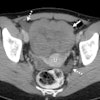
Patients with consecutive negative lung cancer screening results on low-dose CT (LDCT) are more likely not to comply with annual screening protocols, according to a study published May 25 in JAMA Network Open.
The findings mean that more work needs to be done when it comes to patient education, wrote a team led by Dr. Yannan Lin of the University of California, Los Angeles.
"Identifying factors associated with [patient] nonadherence may help resource-constrained health systems to direct targeted outreach to patients who are at high risk of nonadherence and thus likely to receive the greatest benefit from [these] interventions," it noted.
Screening for lung cancer with LDCT has been shown to be effective for reducing mortality from the disease, and even though current guidance says people should start this screening at age 50, uptake has been low.
Lin's group sought to explore why via a study that included data from 1,979 adults who underwent at least one LDCT screening exam between July 2013 and November 2021. Adherence to lung cancer screening was defined in the following manner:
- Lung-RADS score of 1 or 2: Repeated LDCT within 12 months.
- Lung-RADS score of 3: Repeated LDCT within six months.
- Lung-RADS score of 1 or 2: Repeated LDCT within three months.
- Lung-RADS score of 1 or 2: Diagnostic workup (diagnostic chest CT, PET/CT, tissue sampling) within three months of abnormal findings.
The researchers found that the odds of a person not complying with annual lung cancer screening was highest among those with a baseline Lung-RADS score of 1 or 2.
| Rate of nonadherence to annual lung cancer screening/follow-up | |
| Lung-RADS score | Percentage |
| 1 or 2 | 70.5% |
| 3 | 46.1% |
| 4A | 32.3% |
| 4B/X | 19.7% |
"[Our study found that] patients with consecutive negative lung cancer screening results were more likely to be nonadherent with follow-up recommendations," they reported.
The investigation underscores the need for tailored patient outreach regarding lung cancer screening.
"The findings suggest that patients with consecutive negative screening results (Lung-RADS score, 1 or 2) are more likely to become nonadherent to screening over time and may benefit from outreach and education," Lin and colleagues wrote.
But what should this outreach consist of? The researchers suggested appointment reminders and educational materials about lung cancer screening delivered by mail or via electronic patient portals, while at the same time cautioning that these particular measures may need refining.
"While reminders and educational outreach have been helpful in other screening contexts, a greater understanding of the psychological, cognitive, social, and health care practitioner factors associated with [lung cancer] screening adherence may be essential to optimize outreach interventions," they concluded. "Further studies that explicitly examine these factors are needed."





















